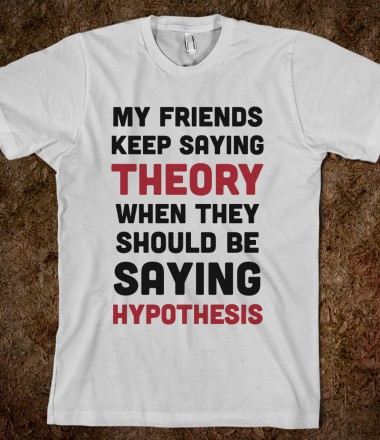 Image via Screened
Image via Screened
It’s not often that we get into science when we start talking about writing. So, this week, we’ll delve into a little geek-speak and look at the differences between hypothetical things and theoretical things.
Hypothetical refers to things that are “assumed by hypothesis; of, pertaining to, or characterized by hypothesis; given to making hypotheses.” The fourth definition involves the principles of logic of either a highly conjectural/not well supported by available evidence proposition or a conditional proposition.
Theoretical refers to something that is “of, or pertaining to, or consisting in theory.” Theories are a coherent group of tested general propositions, commonly regarded as correct.
Here’s the kicker – theory/hypothesis; hypothetical/theoretical – the dictionary lists them as SYNONYMS. Sigh, ok, so what’s a well-meaning word nerd to do? Common usage has these two words being fairly interchangeable when considering something “speculative.”
“Hypothetically, if I run 10 miles a day, I’ll lose weight.”
“Theoretically, if I run 10 miles a day, I’ll lose weight.”
If I run 10 miles a day, I’ll lose weight – is that a theory (tested general proposition, commonly regarded as correct) or a hypothesis (a proposition set forth as an explanation for the occurrence of some specified group of phenomena)? Remember that a theory started out as a hypothesis, and through proven experiments, became a fully-tested theory. A hypothesis starts out as an educated guess on what we think will happen. Proving ourselves right or wrong will take that hypothesis to a theory.
My #1 writing tip is to always consider your audience. If I’m writing for a scientific journal, I’m going to make darn sure that I’ve got my hypotheses and theories in separate corners and dragging them out in appropriate context, lest I be raked over the coals by someone with multiple advanced degrees and published works on a particular theory. In less formal writing, I don’t know that anyone else would really know the difference.
Quick recap:
- Educated guess? Hypothesis.
- Proven and generally accepted as true? Theory.
This topic came up as we were trying to troubleshoot a technical issue, so it is really interesting to look at this in that context. When asked if the fix we were trying to put in would work, should we have said, “Theoretically, yes.” or “Hypothetically, yes.”?
via Business 2 Community http://www.business2community.com/communications/grammar-hammer-hypothetically-speaking-0689884?utm_source=rss&utm_medium=rss&utm_campaign=grammar-hammer-hypothetically-speaking
Aucun commentaire:
Enregistrer un commentaire